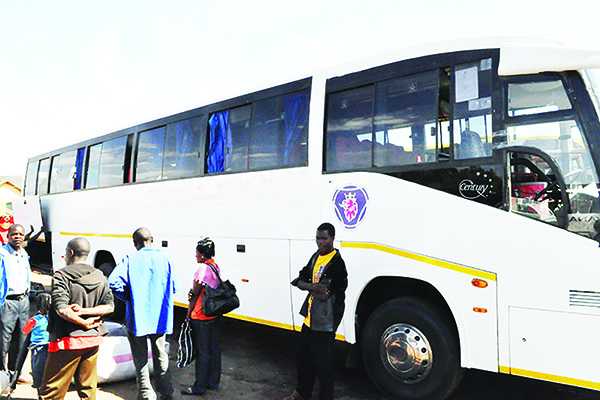Liberalise the public transport system
Undoubtedly, transportation is essential for economic growth and development. Transportation refers to the carrying of people, goods and services (water, power, etc) from one place to another. However, the focus of this instalment is on public transport, specifically domestic long distance passenger transport served by buses.
Due to low private car ownership, the vast majority of citizens use this form of public transport as a principal mode of travel between settlements. Therefore, ensuring its efficiency ought to be of paramount importance.
Needless to mention, efficiency in a free market economy can only be achieved through unhindered competition between the various players in an industry. However, in Botswana, passenger bus public transport, even though it is private sector-driven and operated, is rigidly regulated by the Department of Road Transport and Safety. The department issues operating permits on strict conditions that pre-set bus fares, fixed routes and timetables are adhered to.
The imposition of uniform fares and timetables on public transport is akin to a price freeze on foodstuff and other goods. Food is arguably more critical than transport to households, yet food prices are not regulated, allowing for competition in the industry and the resultant wider choices for consumers. Regulating bus fares is therefore incomprehensive. In fact, it is the only private sector service for which prices are kept uniform.
The status quo denies the passenger bus transport system an opportunity for vigorous competition amongst operators and the resultant growth of the industry. The artificial cap on fares that is not market-driven hinders the provision of value added services because it will not result in increased returns commensurate with the additional investment. In other words, there are no incentives in the industry for the improvement of services. The lack of competition also shields inefficient operators who provide a shoddy service to passengers. Since buses are allocated time slots for departure, passengers are compelled to travel in the bus that departs at a particular time even if it is not a bus of their choice. Deliberately missing a bus because of its poor service and waiting for the next one is never a viable option due to time constraints. The absence of competition is the reason the sector has remained largely stagnant over the years - it has not even kept pace with services provided by government. As a result, the passenger bus transport service is generally substandard and characterised by poor customer care, non-observation of arrival times, breakdowns, narrow, uncomfortable seats with little legroom, lack of air conditioners, seatbelts and toilet facilities and unkempt waiting rooms with non-functioning ablution facilities.
One of the spin-offs of a free market economy is the abundance of options for customers. But this is not the case with our passenger bus service, which suggests that something is seriously amiss. Since economic activities are inter-connected, any major activity that is inefficient drags down the overall performance of the national economy, as the public passenger bus service currently does, which compromises its contribution towards sustained economic growth and development.
The long overdue qualitative growth in the sector has been artificially stifled when, on the other hand, the rest of the private sector has been growing in leaps and bounds as it reaps financial rewards from continuous improvement and innovation. Tragically, the public passenger transport industry is operating at a fraction of its full potential as it is being held back by a hostile regulatory framework that has imposed a command economy on it, inevitably leading to inefficiencies.
Although the regulatory framework may have been prudent during the infancy of the republic given the prevailing socio-economic conditions and the virtually dry national coffers, government has lost sight of the fact that public passenger transport is a profit-driven service financed with personal resources of individuals who, like any other entrepreneur in a free market economy, deserve no less than maximum returns on their investments. Instead, government continued to treat their private investments as a social service despite the huge financial risks they take in setting up their businesses. It is not the operators’ fault that government has not seen it fit to provide public passenger transport service to cater for the lower end of the market just as it does with health and education; the operators should not be victimised for this. At some point, government even scrapped the rail passenger service instead of strengthening and expanding it, with the full knowledge that the long suffering bus operators will be relied upon to step in to provide a social service.
As a way forward, government should devise a hybrid system that allows for an unencumbered, free market-driven public passenger transport service that also ensures that the lower end of the market is catered for. This would mean allowing operators to provide the service outside the current regulatory framework and to set their own fares, determine their routes and timetables as well as build their own waiting rooms.
As a result of competition in the fast moving consumer goods sector, Choppies has emerged as the dominant player followed by Sefalana. The subsequent economies of scale have resulted in lower prices for customers and improved returns on investment for shareholders. The same will ensue if public transport is liberalised and opened up for competition. The few operators that will dominate, just like Choppies and Sefalana, will eventually spread their wings to other countries.
If the government unleashes the full potential of the passenger bus service by freeing it from a restrictive, anti-free market regulatory framework, the industry will soar to heights never before envisaged in terms of efficiency, reliability, quality and employment creation.
*Bugalo A. Chilume is a town planning consultant who deals with planning applications, appeals, etc.; he can be reached at [email protected].






